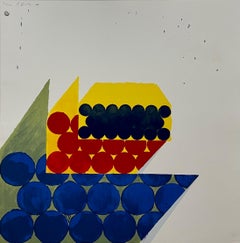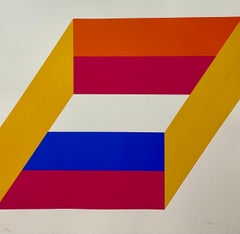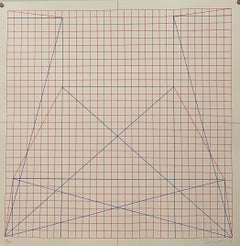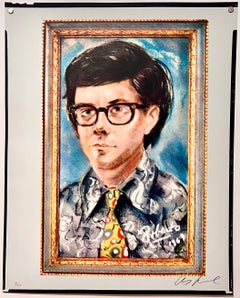Want more images or videos?
Request additional images or videos from the seller
1 of 8
Les LevineColor Silkscreen Pop Art Lithograph Print Les Levine Canadian Pop Art Portrait1969-1971
1969-1971
$850List Price
About the Item
- Creator:Les Levine (1935, Canadian)
- Creation Year:1969-1971
- Dimensions:Height: 25.5 in (64.77 cm)Width: 20.5 in (52.07 cm)
- Medium:
- Movement & Style:
- Period:
- Condition:good. minor wear. never framed. kept in original portfolio.
- Gallery Location:Surfside, FL
- Reference Number:1stDibs: LU38210286052
About the Seller
4.9
Platinum Seller
Premium sellers with a 4.7+ rating and 24-hour response times
Established in 1995
1stDibs seller since 2014
1,845 sales on 1stDibs
Typical response time: 1 hour
Authenticity Guarantee
In the unlikely event there’s an issue with an item’s authenticity, contact us within 1 year for a full refund. DetailsMoney-Back Guarantee
If your item is not as described, is damaged in transit, or does not arrive, contact us within 7 days for a full refund. Details24-Hour Cancellation
You have a 24-hour grace period in which to reconsider your purchase, with no questions asked.Vetted Professional Sellers
Our world-class sellers must adhere to strict standards for service and quality, maintaining the integrity of our listings.Price-Match Guarantee
If you find that a seller listed the same item for a lower price elsewhere, we’ll match it.Trusted Global Delivery
Our best-in-class carrier network provides specialized shipping options worldwide, including custom delivery.You May Also Like
Blue Face
By Roy Lichtenstein
Located in New York, NY
A stunning example of abstracted imagery easily identifiable as the work of Roy Lichtenstein, Blue Face was created by the artist in 1989 as a truly mixed me...
Category
20th Century Pop Art Abstract Prints
Materials
Lithograph, Screen, Woodcut
Shepard Fairey Screen-prints: collection of 60 works (2009-2022)
By Shepard Fairey
Located in NEW YORK, NY
Shepard Fairey Screen-prints: collection of 60 works: 2009-2022:
A rare assemblage of 60 hand-signed Shepard Fairey screen-prints; collected over a near 15 year period (2009-2022). Notable imagery includes: Bob Marley, Keith Haring, Ruth Bader Ginsburg, Kurt Cobain, as well as a series of vivid anti-war pieces defining the artist's practice (title list found further below). Each very well-preserved.
Medium: Screen-prints on heavy paper. 2009-2022 (see below for a list of titles & years).
Dimensions ranging from: 19.5 x 16 inches to 24x36 inches.
Each work is hand-signed; works are either numbered from their respective main editions or notated 'AP' (see last listing image); a few or several works are signed, but not numbered.
Excellent overall condition with the exception of perhaps some minor signs of handling on a few examples.
Provenance: Private collection New York via Shepard Fairey.
Listing images beginning with image 2 represent the actual works.
These works will be shipped flat using protective materials. Please feel free to contact us with any additional questions.
Titles & Years:
OCEAN TODAY...
Category
2010s Pop Art Abstract Prints
Materials
Lithograph, Screen
Niki de Saint Phalle, My Love We Wont, Rare whimsical 1960s silkscreen Signed/N
By Niki de Saint Phalle
Located in New York, NY
Niki de Saint Phalle
My Love We Wont, 1968
Lithograph and silkscreen on wove paper
Signed and numbered 51/75 in graphite pencil on the front
Frame included: elegantly floated and framed in a museum quality white wood frame with UV plexiglass
From the Brooklyn Museum, which has an edition of this work in its permanent collection:
"Throughout her long and prolific career Niki de Saint Phalle, a former cover model for Life magazine and French Vogue, investigated feminine archetypes and women’s societal roles. Her Nanas, bold, sexy sculptures...
Category
1960s Pop Art Abstract Prints
Materials
Screen, Pencil, Lithograph, Mixed Media
$10,000
H 22.5 in W 27 in D 2 in
Human Rights 1981, Robert Rauschenberg
By Robert Rauschenberg
Located in Fairfield, CT
Artist: Robert Rauschenberg (1925-2008)
Title: Human Rights 1981
Year: 1981
Medium: Silkscreen and lithograph on wove paper
Edition: 41/100, plus proofs
Size: 31 x 23 inches
Conditio...
Category
1980s Pop Art Abstract Prints
Materials
Lithograph, Screen
$5,200 Sale Price
20% Off
H 31 in W 23 in
Mirror #7 (C.112), 1972
By Roy Lichtenstein
Located in Greenwich, CT
Mirror #7 (C.112) is a screenprint and lithograph on paper, 29.75 x 17.37 inches, signed and dated 'rf Lichtenstein '72' lower right and numbered 62/80 lower left. From the edition of 96 (there were also 10 AP, and 6 other various proofs). Framed in a contemporary white frame.
Catalog -
Corlett, The Prints of Roy Lichtenstein - A Catalogue Raisonne 1948 - 1997, Hudson Hills Press, NY and National Gallery of Art, Washington, D.C., 2002, pg.125, #112.
About Lichtenstein’s Mirror...
Category
20th Century Pop Art Prints and Multiples
Materials
Lithograph, Screen
Mirror #9 (C.114, Mirror Series), 1972
By Roy Lichtenstein
Located in Greenwich, CT
Mirror #9 (C.114) from the Mirror Series is a screenprint and lithograph on paper, 30 x 21.18 inches, signed and dated 'rf Lichtenstein '72' lower center margin and framed in a contemporary white frame.
Catalog -
Corlett, The Prints of Roy Lichtenstein - A Catalogue Raisonne 1948 - 1997, Hudson Hills Press, NY and National Gallery of Art, Washington, D.C., 2002, pg.126, #114.
About Lichtenstein’s Mirror Series (taken from Corlett):
Mirrors were an important subject in Lichtenstein’s paintings and prints of the early 1970s. From late 1969 to 1972 he painted over forty canvases depicting this subject. The first print was in 1970, with Twin Mirrors (cat. no.102) for the Guggenheim Museum. In 1972 he also produced Mirror (cat. No. 115) at Styria Studio, in addition to this Gemini G.E.L. series of nine prints. In the mid-seventies he took up the subject in sculpture, and he returned to it in prints as recently 1990, with Mirror (cat. No 246). In addition, he has often explored the related theme of reflections, incorporating them in various paintings and in several print series: Reflections (1990; cat. Nos. 239 – 245), Interiors (1990, published 1991; cat. nos. 247 – 54), and Water Lilies (1992; cat. nos. 261 – 66).
This Gemini group (catalog nos. 1-6 - 114) utilizes lithography, screenprint, line-cut, and embossing... In an interview with Lawrence Alloway, Lichtenstein noted: “You know, I am always impressed by how artificial things look – like descriptions of office furniture in newspapers. It is the most dry kind of drawing, as in the Mirrors. They really only look like mirrors if someone tells you they do. Only once you know that, they may be moved as far as possible from realism, but you want it to be taken for realism. It becomes as stylized as you can get away with, in an ordinary sense, not stylish.” As Jack Cowart has commented: “One would not actually stand in front of a Lichtenstein Mirror...
Category
20th Century Pop Art Prints and Multiples
Materials
Lithograph, Screen
Sightseeing James Rosenquist text Pop Art with Roses silver and bright orange
By James Rosenquist
Located in New York, NY
Sightseeing is one of a group of ten prints which the artist made at Petersburg Press in 1972, each based on one of his paintings. Rosenquist’s Sightseeing 1962 oil painting on canva...
Category
1970s Pop Art Abstract Prints
Materials
Lithograph, Screen
$8,500
H 27.5 in W 33.25 in
Horse Blinders (south) and Horse Blinders (east)
By James Rosenquist
Located in New York, NY
Lithograph and screenprint with collage (silver foil)
Prints are different sizes: 36 1/2 x 68 inches (92.7 x 172.7 cm) and 36 5/8 x 64 inches (93 x 162.6 cm)
Published by Multiples...
Category
1970s Pop Art Still-life Prints
Materials
Silver
Olympian Gestures: Rare LACMA Exhibition offset print (Hand Signed by Jim Dine)
By Jim Dine
Located in New York, NY
Jim Dine
Olympian Gestures (Hand Signed by Jim Dine), 1984
Limited Edition lithograph and offset lithograph poster
Hand signed on the front
38 1/5 × 25 inches
The limited edition, h...
Category
1980s Pop Art Abstract Prints
Materials
Screen, Lithograph, Offset
Modern Print /// Roy Lichtenstein Pop Art Abstract Geometric MoMA Gemini G.E.L.
By Roy Lichtenstein
Located in Saint Augustine, FL
Artist: Roy Lichtenstein (American, 1923-1997)
Title: "Modern Print"
*Numbered, signed, and dated by Lichtenstein in pencil lower right
Year: 1971
Medium: Original Lithograph and Scr...
Category
1970s Pop Art Abstract Prints
Materials
Lithograph, Screen
More From This Seller
View AllAbstract Minimalist Color Silkscreen Print Richard Smith On The Bowery Pop Art
By Richard Smith
Located in Surfside, FL
Richard Smith
On the Bowery, 1969 - 1971
silkscreen on Schoeller's Parole Paper, edition of 100 + 20 A.P.
25.5 x 25.5 inches, signed, numbered 21/100
Screenprint in color on wove pa...
Category
1960s Pop Art Abstract Prints
Materials
Lithograph, Screen
1969-71 Abstract Minimalist Color Silkscreen Print Charles Hinman On The Bowery
By Charles Hinman
Located in Surfside, FL
Charles Hinman
On the Bowery, 1969 - 1971
silkscreen on Schoeller's Parole Paper, edition of 100 + 20 A.P.
25.5 x 25.5 inches, signed, numbered 21/100
Screenprint in color on wove p...
Category
1960s Pop Art Abstract Prints
Materials
Lithograph, Screen
Abstract Minimalist Color Silkscreen Print Will Insley On The Bowery Pop Art
Located in Surfside, FL
Will Insley
On the Bowery, 1969 - 1971
silkscreen on Schoeller's Parole Paper, edition of 100 + 20 A.P.
25.5 x 25.5 inches, signed, numbered 21/100
Screenprint in color on wove pape...
Category
1960s Pop Art Abstract Prints
Materials
Lithograph, Screen
Color Silkscreen Pop Art Lithograph Print Les Levine Canadian Pop Art Portrait
By Les Levine
Located in Surfside, FL
Les Levine
On the Bowery, 1969 - 1971
Screenprint in color
25.5 x 25.5 inches, signed, numbered 21/100
Hand signed, published by Edition Domberger, Bonlanden, West Germany (with th...
Category
1960s Pop Art Abstract Prints
Materials
Lithograph, Screen
Joe Tilson British Pop Art Screenprint, Color Lithograph 4 Seasons 4 Elements
By Joe Tilson
Located in Surfside, FL
Silkscreen screenprint or Lithograph
Hand signed and numbered. An esoteric, mystical, Kabbala inspired print with Hebrew as well as other languages.
Joseph Charles Tilson RA (born 2...
Category
1970s Pop Art Abstract Prints
Materials
Screen, Lithograph
Judy Rifka Abstract Expressionist Contemporary Lithograph Hebrew 10 Commandment
By Judy Rifka
Located in Surfside, FL
Judy Rifka (American, b. 1945)
44/84 Lithograph on paper titled "Thou Shalt Not Bear False Witness against Thy Neighbor"; Depicting an abstract composition in blue, green, red and black tones with Hebrew script. Judaica interest. (I have seen this print described as a screenprint and as a lithograph)
Hand signed in pencil and dated alongside an embossed pictorial blindstamp of a closed hand with one raised index finger. Solo Press.
From The Ten Commandments Kenny Scharf; Joseph Nechvatal; Gretchen Bender; April Gornik; Robert Kushner; Nancy Spero; Vito Acconci; Jane Dickson; Judy Rifka; Richard Bosman and Lisa Liebmann.
Judy Rifka (born 1945) is an American woman artist active since the 1970s as a painter and video artist. She works heavily in New York City's Tribeca and Lower East Side and has associated with movements coming out of the area in the 1970s and 1980s such as Colab and the East Village, Manhattan art scene. A video artist, book artist and abstract painter, Rifka is a multi-faceted artist who has worked in a variety of media in addition to her painting and printmaking. She was born in 1945 in New York City and studied art at Hunter College, the New York Studio School and the Skowhegan School of Painting and Sculpture in Maine.
Rifka took part in the 1980 Times Square Show, (Organized by Collaborative Projects, Inc. in 1980 at what was once a massage parlor, with now-famous participants such as Jenny Holzer, Nan Goldin, Keith Haring, Kenny Scharf, Jean-Michel Basquiat, and Kiki Smith, the roster of the exhibition reads like a who’s who of the art world), two Whitney Museum Biennials (1975, 1983), Documenta 7, Just Another Asshole (1981), curated by Carlo McCormick and received the cover of Art in America in 1984 for her series, "Architecture," which employed the three-dimensional stretchers that she adopted in exhibitions dating to 1982; in a 1985 review in the New York Times, Vivien Raynor noted Rifka's shift to large paintings of the female nude, which also employed the three-dimensional stretchers. In a 1985 episode of Miami Vice, Bianca Jagger played a character attacked in front of Rifka's three-dimensional nude still-life, "Bacchanaal", which was on display at the Museum of Art Fort Lauderdale. Rene Ricard wrote about Rifka in his influential December 1987 Art Forum article about the iconic identity of artists from Van Gogh to Jean-Michel Basquiat and Keith Haring, The Radiant Child.The untitled acrylic painting on plywood, in the collection of the Honolulu Museum of Art, demonstrates the artist's use of plywood as a substrate for painting. Artist and writer Mark Bloch called her work "imaginative surfaces that support experimental laboratories for interferences in sensuous pigment." According to artist and curator Greg de la Haba, Judy Rifka's irregular polygons on plywood "are among the most important paintings of the decade".
In 2013, Rifka's daily posts on Facebook garnered a large social media audience for her imaginative "selfies," erudite friendly comments, and widely attended solo and group exhibitions, Judy Rifka's pop art figuration is noted for its nervous line and frenetic pace. In the January 1998 issue of Art in America, Vincent Carducci echoed Masheck, “Rifka reworks the neo-classical and the pop, setting all sources in quotation for today’s art-world cognoscenti.” Rifka, along with artists like David Wojnarowicz, helped to take Pop sensibility into a milieu that incorporated politics and high art into Postmodernism; Robert Pincus-Witten stated in his 1988 essay, Corinthian Crackerjacks & Passing Go that "Rifka’s commitment to process and discovery, doctrine with Abstract Expressionist practice, is of paramount concern though there is nothing dogmatic or pious about Rifka’s use of method. Playful rapidity and delight in discovery is everywhere evident in her painting." In 2016, a large retrospective of Rifka's art was shown at the Jean-Paul Najar Foundation in Dubai. In 2017, Gregory de la Haba presented a Rifka retrospective at the Amstel Gallery in The Yard, a section of Manhattan described as "a labyrinth of small cubicles, conference rooms and small office spaces that are rented out to young entrepreneurs, professionals and hipsters". In 2019 her video Bubble Dancers New Space Ritual was selected for the International Istanbul Bienali.
Alexandra Goldman Talks To Judy Rifka About Ionic Ironic: Mythos from the '80s at CORE:Club and the Inexistence of "Feminist Art" Whitehot Magazine of Contemporary Art. She was included in "50 Contemporary Women Artists", a book comprising a refined selection of current and impactful artists. The foreword is by Elizabeth Sackler of the Brooklyn Museum’s Sackler Center for Feminist Art. Additional names in the book include sculptor and carver Barbara Segal...
Category
1980s Pop Art Abstract Prints
Materials
Lithograph, Screen



